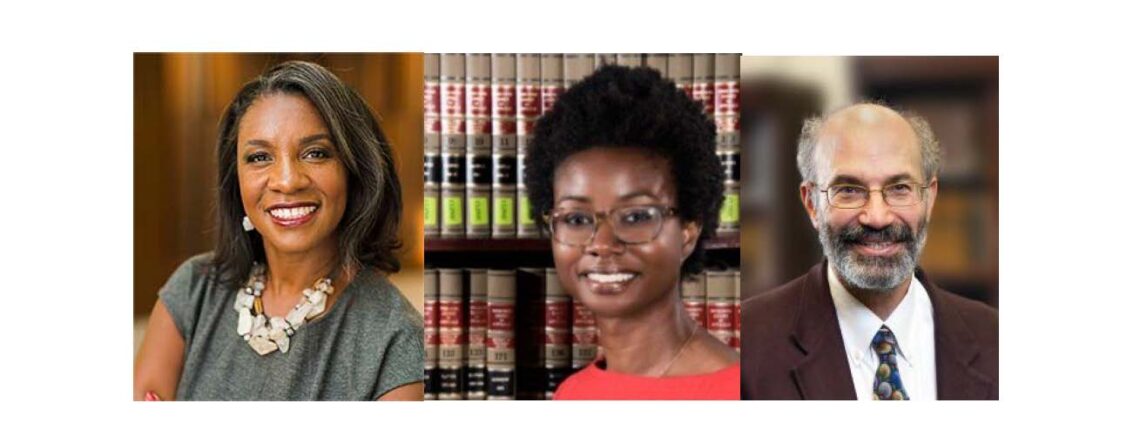At its upcoming Virtual Annual Awards Celebration to be held on January 8, 2021, SALT is excited to honor three champions of justice, diversity and teaching excellence:
- Professor Norrinda Brown Hayat of Rutgers Law School will receive the Junior Faculty Award
- Professor Jules Lobel of the University of Pittsburgh School of Law will receive the SALT Great Teacher Award
- Professor Erika George of the University of Utah S.J. Quinney College of Law will receive the M. Shanara Gilbert Human Rights Award
To join the celebration on January 8 at 7:15 pm eastern time, register here: 2021 SALT Annual Celebration – Registration. We will email you with information about joining the event a few days before January 8. If you are interested in purchasing an advertisement in the program for this event visit SALT 2021 Sponsorship.
Prof. Hayat, the Junior Faculty Award winner, serves as clinical professor of law at Rutgers Law and specifically as the Director of the Civil Justice Clinic. She focuses her clinical teaching and practice on housing justice issues. The clinic’s work ranges from individual landlord – tenant disputes to broader land use and anti-gentrification equity work. She also brings in creative advocacy approaches. For example, most recently, her clinic helped organize a twitterstorm with others to freeze evictions. Outside of the clinic, Hayat teaches a critical race theory course. A student shared Hayat’s approach in this class: “she infuses visual art, literature, and music as ways to undergird and challenge our conventional readings of the law. “ More broadly, students have described Hayat as dynamic, creative, perceptive, profound, dedicated, and powerful. Outside of the classroom, Hayat’s scholarly agenda focuses on housing discrimination and the intersection of race, space, and place; her most recent piece will be published the NYU Review of Law and Social Change. Hayat was elected to the AALS Clinical Section Executive Board this past year and has also been active in advocacy efforts within the law school building. For example, this past summer, Hayat was one of the three principal co-drafters – and the only non-tenured faculty – of Rutgers’ anti-racism statement, which was lauded as a model for other law schools across the country.
Prof. Lobel, the Great Teacher Award winner, has been a professor at Pitt Law since 1983, compiling an extraordinary record of excellence in teaching and commitment to social justice. Just in the past two decades, Lobel has made it his life’s work to represent prisoners and has become a leading voice in the campaign to end solitary confinement and improve the inhumane conditions of mass incarceration and the prison industrial complex. As detailed in his nominating materials, Prof. Lobel has integrated his teaching and social justice lawyering throughout his courses. For example, in 2002, Lobel co-counseled a major class action (Wilkinson v. Austin) challenging prolonged solitary confinement at the Ohio State Penitentiary in Youngstown, Ohio. Lobel ultimately took the case all the way to the U.S. Supreme Court, establishing that prisoners placed in prolonged solitary had a liberty interest entitling them to due process. For this case, students did research, wrote memoranda, held strategy sessions, mooted Lobel, attended the argument and met with human rights organizations and co-counsel in D.C. Ever since Wilkinson, Lobel has been a leading national change-agent in challenging solitary confinement and has continued to involve his students in his work. This builds on his prior work in partnership with Center for Constitutional Rights, where he litigated many cases challenging human rights violations and abuse of war powers, under international law and U.S. Constitutional Law for a number of years. Prof. Lobel also now co-teaches a prison litigation class with a former student and director of a local nonprofit that Lobel helped get up and running, which combines doctrinal analysis with clinical instruction where the students work on cases, interviewing prisoners, participating in strategy sessions and drafting memoranda and briefs.
Prof. George, the M. Shanara Gilbert Human Rights Award winner, professor at Utah Law since 2003 and now director of the Tanner Humanities Center, has been a champion for human rights inside and outside of the classroom. George developed one of the first Business and Human Rights courses in the country. As noted in her nomination materials, she works to bring together apparently disparate areas of the law and encourages students to view business enterprises through a broader lens in order to identify potential risks to human rights and opportunities to leverage corporate and securities laws to promote human rights protection. She has hosted guests from labor rights activists to corporate counsel for major multinational firms and start up founders in her corporate citizenship seminar courses. She believes exposure to a range of different viewpoints and positions serves to expand her students’ capacity to understand issues of inequality and exclusion. As former Co-Director of the Center for Global Justice at Utah Law, she conceived and coordinated the Partnerships to Empower through Rights Education Project, supervising the Project’s original law and policy research on violence against migrant women and visa practices that place women at risk. In addition to her law school service and teaching, Professor George provides human rights education to graduate students in the University’s Masters of International Affairs and Global Enterprise program. She was Interim Director of the Tanner Center for Human Rights from 2018-2019; here, as the government enforced a ban on foreign nationals from predominantly Muslim countries, George focused human rights programming on minority rights protection. In the midst of all of these responsibilities, George has focused on diversity, equity, and inclusion issues, serving as a source of strength for individuals in the campus community who find themselves at the intersection of different identities in a predominantly white institution – whether faculty, staff, or students.
Please join us in thanking our wonderful awards committee Alexi Freeman, Caitlin Barry, and Joan Howarth!
